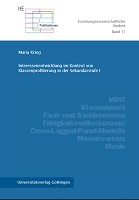Interessenentwicklung im Kontext von Klassenprofilierung in der Sekundarstufe I
| dc.contributor.author | Krieg, Maria | |
| dc.date.accessioned | 2022-12-01T04:30:45Z | |
| dc.date.available | 2022-12-01T04:30:45Z | |
| dc.date.issued | 2022 | |
| dc.identifier.uri | https://library.oapen.org/handle/20.500.12657/59805 | |
| dc.description.abstract | Classes with a special emphasis (so-called profile classes) represent a central element of current school development processes and are considered as one of the most prominent ways of practical implementation of school autonomy. At the secondary level, profile classes in music and science (music and STEM classes) are becoming increasingly popular. Specific features of profile classes (including additional lessons, innovative and practice-based teaching and learning formats, and the involvement of student labs) are associated with various pedagogical potentials – especially in terms of fostering students’ interest and their self-concept. However, there is a research gap regarding the development of students’ subject-related interests and their self-concept in profile classes at the secondary level. The findings of the present study indicate differences in the development of the interests in music and science as well as the domain-specific self-concept between music classes, STEM classes and classes without a specific profile. Using cross-lagged-panel-models, the longitudinal relations among interest and self-concept are estimated in addition to the correlations of the constructs within each wave and the autoregressive effects within each construct over time. In this regard, differences in the cross-lagged panel models between profile classes and classes without a specific profile are examined. The results allow an evaluation of the potential of profile classes in order to promote students’ interest and self-concept and offer a variety of implications for pedagogical practice. | |
| dc.language | German | |
| dc.subject.classification | thema EDItEUR::J Society and Social Sciences::JN Education | en_US |
| dc.subject.other | educational science | |
| dc.subject.other | profile classes | |
| dc.subject.other | new learning | |
| dc.title | Interessenentwicklung im Kontext von Klassenprofilierung in der Sekundarstufe I | |
| dc.type | book | |
| oapen.identifier.doi | 10.17875/gup2022-1950 | |
| oapen.relation.isPublishedBy | ffaff15c-73ed-45cd-8be1-56a881b51f62 | |
| oapen.collection | AG Universitätsverlage | |
| oapen.description.otherlanguage | Profilierungsmaßnahmen auf Klassenebene (sogenannte Profilklassen) stellen ein zentrales Element aktueller Schulentwicklungsprozesse dar und gelten als prominenteste Form der praktischen Umsetzung zunehmender Schulautonomie. In der Sekundarstufe I gewinnen vor allem Profilklassen im musikalischen sowie naturwissenschaftlichen Bereich (Musik- bzw. MINT-Klassen) zunehmend an Popularität. Einzelne Gestaltungsmerkmale des Profilunterrichts (u.a. zusätzliche Unterrichtsstunden, innovative und praxisbezogene Lehr-Lern-Formate sowie der Einbezug außerschulischer Lernorte) werden mit vielfältigen pädagogischen Potentialen verbunden – insbesondere für das Interesse sowie das Fähigkeitsselbstkonzept der Schülerinnen und Schüler. Hinsichtlich einer differenzierten Analyse der Entwicklung des Fach- und Sachinteresses sowie des Fähigkeitsselbstkonzepts der Schülerinnen und Schüler in Profilklassen der Sekundarstufe I besteht aktuell jedoch ein Forschungsdesiderat. Die Ergebnisse der vorliegenden Arbeit geben Aufschluss über die Entwicklung des durchschnittlichen Fach- und Sachinteresses sowie des Fähigkeitsselbstkonzepts zwischen der fünften und siebten Jahrgangsstufe in den Domänen Musik und Naturwissenschaften. Dabei wird der Effekt des Besuchs einer Musik- oder MINT-Profilklasse herausgestellt. Anhand latenter Cross-Lagged-Panel-Modelle werden darüber hinaus die Stabilität sowie die längsschnittliche Zusammenhangsstruktur des Fach- beziehungsweise Sachinteresses und des Fähigkeitsselbstkonzepts untersucht und mögliche Unterschiede zwischen Profilklassen und deren Parallelklassen ohne Profil beleuchtet. Die Befunde ermöglichen die Evaluation des Potentials von Profilklassen zur Förderung des Interesses sowie des Fähigkeitsselbstkonzepts und bieten vielfältige Anknüpfungspunkte für die pädagogische Praxis. |

